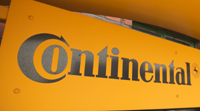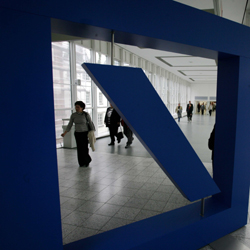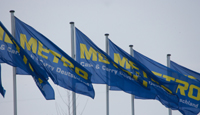VIPsight - 1st Edition 2017
COMPANIES
Continental: Joint venture with Nexteer Automotive in Motion Control Systems announced
 During a press conference at the North American International Auto Show, Nexteer Automotive and Continental announced their agreement to form a joint venture focused on the advancement of motion control systems and actuator components for automated driving. This joint venture will combine Nexteer’s advanced steering and driver assistance (ADAS) technologies with Continental’s portfolio of Automated Driving and advanced braking technologies.
During a press conference at the North American International Auto Show, Nexteer Automotive and Continental announced their agreement to form a joint venture focused on the advancement of motion control systems and actuator components for automated driving. This joint venture will combine Nexteer’s advanced steering and driver assistance (ADAS) technologies with Continental’s portfolio of Automated Driving and advanced braking technologies.
Nexteer and Continental will hold an equal 50-50 percent ownership position in the joint venture. The joint venture will focus on research and development activities including rapid evaluation, design and prototyping. Pending regulatory approvals, it is expected that this project will be operational in the first quarter of 2017.
Welcome home, Deutsche Bank
 Many people regard Volkswagen as the prime example to demonstrate the high cost of poor corporate governance. But, in fact, one might as well turn to Deutsche Bank with its many expensive strategic turns and twists in recent years. Some years ago, the Bank could easily absorb the costs of poor leadership. More recently, however, it looks like growing concerns about the solidity of the bank and its local presence in the market became the most important element in the bank`s decision making process.
Many people regard Volkswagen as the prime example to demonstrate the high cost of poor corporate governance. But, in fact, one might as well turn to Deutsche Bank with its many expensive strategic turns and twists in recent years. Some years ago, the Bank could easily absorb the costs of poor leadership. More recently, however, it looks like growing concerns about the solidity of the bank and its local presence in the market became the most important element in the bank`s decision making process.
On March 5th, 2017 the bank announced the next strategic refinement. While the intended capital increase and asset disposals strengthen the equity basis and make it easier to deal with the remaining so-called “legal issues” (namely, the results of inappropriate behavour), the “re-integration” of Postbank marks an important strategic milestone – a new focus on the home market. The decision may come a little late, and perhaps it was enhanced by potential valuation issues with the initially planned sale of Postbank. But it looks like the natural thing to do since investment banking windfall profits largely disappeared from the screens. So welcome back at home, Deutsche Bank.
Deutsche Post DHL Group: UK Mail acquisition completed
Following the UK Mails shareholders resolutions at the General Meeting and the Court Meeting on November 18, 2016, the acquisition of UK Mail by Deutsche Post DHL was granted unconditional clearance by the European Commission on December 16, 2016. The UK Mail`s Scheme of Arrangement effecting the acquisition was sanctioned by the High Court of Justice in England and Wales on December 29, 2016.
DHL Parcel expanded its cross-border network since 2014 to cover 18 European countries. With the acquisition of UK Mail´s operations, Deutsche Post DHL Group added the nationwide infrastructure, a motivated team and high quality service capabilities to the European parcel network of Deutsche Post DH, according to Jürgen Gerdes, Deutsche Post DHL Group Board Member Post – eCommerce – Parcel.
METRO GOUP: Release of further details of the Demerger
 At the Capital Markets Day in Düsseldorf, METRO GROUP released further details of the planned demerger. The wholesale and food business will operate under the corporate brand METRO, while the consumer electronics division will operate under the brand CECONOMY.
At the Capital Markets Day in Düsseldorf, METRO GROUP released further details of the planned demerger. The wholesale and food business will operate under the corporate brand METRO, while the consumer electronics division will operate under the brand CECONOMY.
The new METRO AG is positioned as internationally leading specialist in wholesale and food retail, and primarily comprises METRO Cash & Carry, in addition to delivery specialists and other companies. The second activity under the new roof is Real, a large-scale, full-range supplier (hypermarket) in the food retail sector in Germany. As a benchmark for the distribution of dividends, the future METRO AG confirmed a targeted range of 45 to 55% of the company´s earnings per share.
CECONOMY is the holding company of Media Saturn, the European number one in consumer electronics on the basis of its sales of €22B (fiscal year 2015/16). In the past two years, Media Saturn hat increased sales and improved profitability. In principle, the company intends to base its dividend payment on a payout ratio of 45 to 55% of the earnings per share.
While it is intended that the former METRO AG will continue to exist as future CECONOMY AG and will constitute the consumer electronics business, it is planned that the wholesale and food specialist will be spun off as an independent, stock-listed company and will operate under the established name of METRO. The separation will be proposed to shareholders at a 1:1 ratio.
The AGM of METRO AG will vote on this demerger on Feb. 6, 2017. The Management Board of the former METRO AG expects that both companies will meet the MDAX criteria.
BASF: BASF continues with its portfolio optimization with the sale of its industrial coatings business and the acquisition of Chemetall
 BASF has completed the sale of its global industrial coatings businesses to AkzoNobel. The transaction includes technologies, patents and trademarks, as well as the transfer of dedicated production sites in Deeside, United Kingdom, and Vanderbijlpark, South Africa. As a result of this transaction, AkzoNobel will now operate the global coil, furniture foil and panel coatings, wind coatings and general industry businesses acquired from BASF, as well as the commercial transport business in EMEA. These businesses generated sales of approximately €300M in 2015.The remaining portfolio of the Coatings division consisting of the automotive OEM and automotive refinish coatings businesses, as well as the decorative paints business with the leading brand Suvinil® in Brazil, had sales of approximately €2.9B in 2015.
BASF has completed the sale of its global industrial coatings businesses to AkzoNobel. The transaction includes technologies, patents and trademarks, as well as the transfer of dedicated production sites in Deeside, United Kingdom, and Vanderbijlpark, South Africa. As a result of this transaction, AkzoNobel will now operate the global coil, furniture foil and panel coatings, wind coatings and general industry businesses acquired from BASF, as well as the commercial transport business in EMEA. These businesses generated sales of approximately €300M in 2015.The remaining portfolio of the Coatings division consisting of the automotive OEM and automotive refinish coatings businesses, as well as the decorative paints business with the leading brand Suvinil® in Brazil, had sales of approximately €2.9B in 2015.
The Coatings business has been further strengthened with the acquisition of Albemarle`s global surface treatment business, Chemetall, this week. Through this acquisition, BASF’s Coatings division expands its portfolio to become a more complete solutions provider. Chemetall’s sales for the full calendar year of 2015 were $845M. To prepare for a seamless integration, BASF has established a Global Integration Management Team, which will ensure business continuity while maintaining a clear priority on meeting customer needs.
Allianz: Allianz and HypoVereinsbank conclude sales collaboration
HypoVereinsbank (part of UniCredit) announced that Allianz will be the new insurance partner as of January 1, 2018. The collaboration widens the product range offered to the bank`s customers to include life, property and health insurance solutions. Customers will have access to advisers from HypoVereinsbank and Allianz for holistic and needs-oriented consultation. The personal consultation will be complemented by online packages and services. Allianz is using the collaboration to further expand sales through banks as part of its growth initiative, while HypoVereinsbank expects a strengthening of its market position and significant revenue potential.
As of December 31, 2017, the new collaboration with Allianz will replace the previous partnership of UniCredit’s HypoVereinsbank with the Ergo Group. HypoVereinsbank customers’ contracts with Ergo will remain in force. As of January 1, 2018, customers can only enter into new insurance contracts with Allianz, if going through the bank. Details of the new collaboration will be communicated prior to the launch.
Covestro: Easier Access to U.S. Capital Market
Covestro initiated a Level 1 ADR program with the intention of easing access to its shares for global investors. Covestro`s ADRs have been trading on the U.S. OTC (Over-the-Counter) market since December 1, 2016, under the trading symbol COVTY. The program enables the company to make direct contacts with registered depositary receipt investors. Through the sponsored ADR-program, Covestro wants to broaden its shareholder base for the long term and simplify access to its shares. In addition, the program enables the company to offer its employees in the U.S. the opportunity to take part in the company`s share participation program, which is expected to be launched in 2017.
The financial services provider Bank of New York Mellon was chosen as the depositary bank for the sponsored ADR program.
Biotest: Altered Tax Assessments lead to decrease of claims against Biotest
Biotest received revised tax assessments for corporate tax, solidarity tax and trade tax for the years 2005 to 2008. The revisions related to Biotest´s Russian business. The new assessments result in a decrease in tax and interest expenses of €6.9M. The company announced that it accepts the new assessments. At the same time, Biotest informed that it is in advanced discussions with the investigative authorities as to the completion of the summary proceedings regarding a fine. The prosecutor has already applied for the fine at the responsible court. The resulting liability of €1.0M was already set aside as provision in the September 30, 2016 results. Also, the authorities discontinued the investigations against several defendants from Biotest, but continue the investigations against three of the company´s managers.
Grammer: Demand from minority shareholder to get influence on the board composition rejected
 In a voting rights notification published by the investor Cascade International Investment GmbH, Cascade demands the right to exert influence on the composition of Grammer AG’s Executive Board and Supervisory Board. With one exception, Cascade intends to replace all existing shareholder representatives on the Supervisory Board. According to Grammer, the nominees of Cascade are nearly all present or former employees of the Prevent Group, which is controlled by the Hastor family, and in addition, Cascade intends to dismiss the Chief Executive Officer of Grammer AG.
Grammer said that, according to publicly available information, Cascade, who is a 10.001 percent shareholder in Grammer, is a wholly owned subsidiary of Eastern Horizon Group Netherlands, in which the two sons of the entrepreneur Nijaz Hastor, Kenan and Damir Hastor, jointly hold a majority interest. In addition, Kenan and Damir Hastor are currently also the sole shareholders of Halog GmbH & Co. KG, which holds a further 10.22 percent stake in Grammer.
Grammer AG’s Executive Board and Supervisory Board stated that they are unequivocally committed to the continuation of the “successful corporate strategy and independent corporate governance in the interests of all shareholders and stakeholders” and therefore rejected Cascade’s demands. In a side remark, Grammer also stressed that important customers are also observing the changes in the shareholder structure and holdings of the Hastor family in Grammer AG very closely.
In a voting rights notification published by the investor Cascade International Investment GmbH, Cascade demands the right to exert influence on the composition of Grammer AG’s Executive Board and Supervisory Board. With one exception, Cascade intends to replace all existing shareholder representatives on the Supervisory Board. According to Grammer, the nominees of Cascade are nearly all present or former employees of the Prevent Group, which is controlled by the Hastor family, and in addition, Cascade intends to dismiss the Chief Executive Officer of Grammer AG.
Grammer said that, according to publicly available information, Cascade, who is a 10.001 percent shareholder in Grammer, is a wholly owned subsidiary of Eastern Horizon Group Netherlands, in which the two sons of the entrepreneur Nijaz Hastor, Kenan and Damir Hastor, jointly hold a majority interest. In addition, Kenan and Damir Hastor are currently also the sole shareholders of Halog GmbH & Co. KG, which holds a further 10.22 percent stake in Grammer.
Grammer AG’s Executive Board and Supervisory Board stated that they are unequivocally committed to the continuation of the “successful corporate strategy and independent corporate governance in the interests of all shareholders and stakeholders” and therefore rejected Cascade’s demands. In a side remark, Grammer also stressed that important customers are also observing the changes in the shareholder structure and holdings of the Hastor family in Grammer AG very closely.
Clearstream sees GSF volume shortfall
Clearstream’s global securities financing average outstanding volume fell by 14 percent in 2016. The clearinghouse recorded €515.9 billion in outstanding volume for the year, down from €598.6 billion in 2015. Clearstream also ended the year with its December global securities financing (GSF) volume missing compared to €542.1 billion 12 months before. Clearstream is on the cusp of finally going live on the Target2-Securities (T2S) platform as part of the initiative’s fourth phase of implementation on 6 February, which will include the large German market. Even when prospected there is no combined start with Euroclear who is behind schedule. As two of the largest EU clearinghouses to utilise the platform, it was deemed impractical to initiate both in the same phase. Clearstream alone is expected to bring about 40 percent of the overall volume to the settlement platform.















